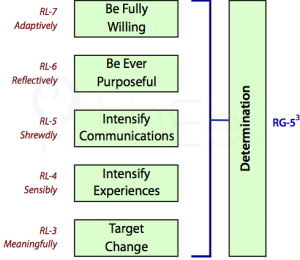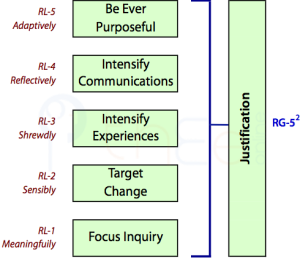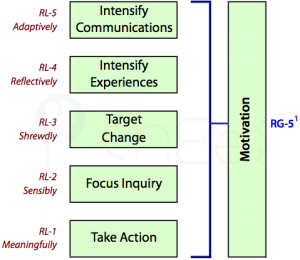Regimens of Vantage
Assessing Ourselves & Others
Understanding the internal structure of determination, justification and motivation may have diagnostic value.
We usually know about our own determination, the quality of our justifications and our state of motivation. If we don't know, then self-deception and self-delusion are propping up self-esteem and any confrontation will be felt as an unwelcome intrusion.
However, the perseverance of others will matter to us if we are involved in a venture with them. We must then assess, at any moment, just how determined, justified and motivated someone else is—especially when it is not in their interest to be perceived as lacking perseverance.
Each of the regimens that are intrinsic to perseverance are described below using the internal structure to identify key features.
The Three Regimens
Determination-RG53

Determination is about fixating yourself at all times on making specific progress. It is well, if implicitly, understood to involve an emotional intensity-RL4 about getting some change-RL3 that is based on goals-RL6, that are pursued willingly-RL7 and communicated-RL5 clearly. However, the way each of these components is handled is crucial.
 Be fully willing-RL7:g5 but adaptively
Be fully willing-RL7:g5 but adaptively
Determination may resemble stubbornness, but it is intelligent rather than bullheaded. This shows up in your willingness to adapt in the face of intractable situations, or unexpected disappointments.
- If you downplay or ignore difficulties and external forces and refuse to adapt, then there will be a diffusion or waste of your energies.
 Be ever purposeful-RL6:g4 but reflectively
Be ever purposeful-RL6:g4 but reflectively
Determination is intrinsically purposeful, however it calls for more thought about those purposes: how comfortable you are with them, how fitting they are, and how they can be applied in the current situation.
- If you are not reflecting on your goals to check their suitability and to reaffirm them unequivocally, there must be some ambivalence (or dishonesty) that will surely block any significant success.
 Intensify communications-RL5:g3 but shrewdly
Intensify communications-RL5:g3 but shrewdly
Determination requires inner support and ideally support from others as well. That requires you to be thinking and talking in a way that makes persistence seem wise and evidence of your strength and character.
- If you do not re-frame obstacles or failures and continually redefine reality, you will find it difficult to sustain focus and energy, and others will fall away.
 Intensify experiences-RL4:g2 but sensibly
Intensify experiences-RL4:g2 but sensibly
You must feel determined as well as be determined. That entails a degree of self-control and inner balance. You must look at obstacles from various perspectives and become aware, but never over-emotional and never arrogant.
- If you become over-sensitive to issues or insensitive to new options or breakthroughs, then you lose the benefits of determination.
 Target change-RL3:g1 but meaningfully
Target change-RL3:g1 but meaningfully
Determination has to bed down in something tangible and a specific relevant targeted stage, even if a small step, needs to be identified. A journey of a hundred miles is made up of many single steps.
- If you do not identify the next stable configuration, then you are all talk, and determination starts to look unreal.
Justification-RG52

Justification is about providing a rationale for persisting and adjusting your handling of the challenge. It is well, if implicitly, understood to involve proffered explanations-RL5 in the form of a story based on your experiences-RL4 and goals-RL6 with the view to getting some change-RL3 that makes sense in terms of inquiries-RL2. As with determination, the way that each of these components is handled is crucial.
 Be ever purposeful-RL6:g5 but adaptively.
Be ever purposeful-RL6:g5 but adaptively.
Justifying perseverance must be based on a goal that fits the situation and takes account of the setbacks, delays or failure that you have experienced.
- If there is no change in the goals, then no justification is required because your work on the challenge proceeds as expected. However, if the project is stagnating or going wrong, you will feel the need to justify: and the natural way to do this is to adapt purposes in some way that permits continuance.
 Intensify communication-RL5:g4 but reflectively.
Intensify communication-RL5:g4 but reflectively.
Justification is more about talking to yourself intelligently than about addressing others, although that is often necessary. You must develop a credible story to keep going on the challenge and that requires reflection.
- If you cannot justify persevering to yourself, then you will lack conviction and lose energy or give up.
 Intensify experiences-RL4:g3 but shrewdly.
Intensify experiences-RL4:g3 but shrewdly.
In justifying you must pick and choose amongst the ideas, feelings and intuitions to determine what to intensify. Negative feelings like regret, disappointment or revenge must be minimized or dismissed as unhelpful or counter-productive.
- If you do not discriminate amongst your feelings and carefully select those which bolster perseverance, a justification is likely to appear as a lame or dishonest excuse.
 Target change-RL3:g2 but sensibly.
Target change-RL3:g2 but sensibly.
Justification should work together with determination to make the chosen change target appear sensible as well as meaningful.
- If there is no credible target and time-scale for it, then you miss out on one of the primary benefits of justification in managing the evolution of a project.
 Focus inquiry-RL2:g1 but meaningfully.
Focus inquiry-RL2:g1 but meaningfully.
Justification has to be based in facts and reasons that are relevant to the situation. So inquiry is its foundation.
- If you do not focus or if you become too theoretical, your justifications will lack credibility and relevance.
Motivation-RG51

Motivation is about keeping yourself (and often others) acting at all times so as to make progress. It is well, if implicitly, understood to involve intensely communicating-RL5 and activating strong feelings-RL4 to generate action-RL1 that leads to some change-RL3 that is reasonable being based on inquiry-RL2.
 Intensify communications-RL5:g5 but adaptively
Intensify communications-RL5:g5 but adaptively
It is all about what you say and how you say it. Motivational messages that work in one situation will not work in another. That is why those clever-artistic motivational posters are so irritating to employees.
- If some suitable story, idealistic phrase or passionate rhetoric is not found, then drive will be lacking. If appropriate, pressure or threats may motivate effectively.
 Intensify experiences-RL4:g4 but reflectively
Intensify experiences-RL4:g4 but reflectively
Motivation requires that you address your own inner feelings. The root of feelings like futility, impotence and apathy must be recognized so they can be overcome.
- If you do not empathize with others and reflect on your own experiences, then you will not know what emotions will make a difference in the situation. You may need to evoke anger "I'll show them!", or pride "I never give up!", or competitiveness "aren't we the best!".
 Target change-RL3:g3 but shrewdly
Target change-RL3:g3 but shrewdly
Motivation thrives on the expectation of worthwhile success. So you must select a future state with a range of qualities that works as a motivator. Generalization is difficult. Usually the requirement is for a developmental stage that is neither too trivial or simple, nor too difficult or complicated. But occasionally a seemingly unreachable target is best.
- If the target is not well chosen, then it may be achieved but without the desired benefit. If the target is well chosen, it may not be achieved, and yet a variety of benefits may result e.g. welding a team whose members trust each other.
 Focus inquiry-RL2:g2 but sensibly.
Focus inquiry-RL2:g2 but sensibly.
Inquiry is intrinsic to motivation simply because it provides the good sense that should inform other features, especially choice of targets and decisions to reach them.
- If you do not focus inquiries on clarifying relevant factors and issues in the situation, then you are unlikely to handle any of the other components well.
 Take action-RL1:g1 but meaningfully.
Take action-RL1:g1 but meaningfully.
Motivation is recognized most obviously by a flow of meaningful decisions and actions. These are guided by sensible inquiry and other higher level choices.
- If you witness procrastination, laziness, avoidance, confusion and exhaustion, then you can be sure that motivation is lacking. The solution usually lies at higher levels.
Perseverance alone is not enough when you come to major blocks. Unless you get a breakthrough, you may be stymied and the challenge will not be met.
Creativity, in the sense of mental-imaginative work, is distributed through this whole structure. So it is misleading to perceive these breakthroughs as the essence of creativity.
- Nevertheless breakthroughs do play a major role in any creative process and demand immersion.
Originally posted: 31-Jan-2012; Last updated: 10-Jul-2013.

![]() Be fully willing but adaptively
Be fully willing but adaptively![]() Be ever purposeful but reflectively
Be ever purposeful but reflectively![]() Intensify communications but shrewdly
Intensify communications but shrewdly![]() Intensify experiences but sensibly
Intensify experiences but sensibly![]() Target change but meaningfully
Target change but meaningfully
![]() Be ever purposeful but adaptively.
Be ever purposeful but adaptively.
![]() Focus inquiry but sensibly.
Focus inquiry but sensibly.